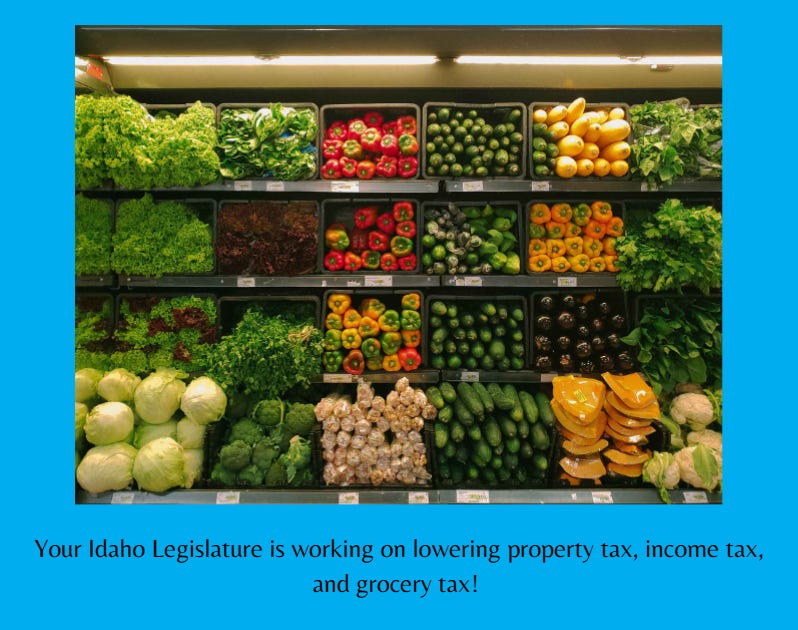You Are Invited to Our Third Legislative Update!

West Boise Library Listening Sessions
As you may be aware, the Boise Public Library is now developing a facilities plan that will guide the development of the Boise Library for the next 10 - 20 years. They announced they will be hosting “Community Listening Sessions” from March 5th to March 13th to ensure that they’ve used all means possible to gather community input for the facilities plan.
The closest session for Citizens in West Boise will be Friday, March 7th, from 3-4:30 pm at the Library! at Cole & Ustick in the Sagebrush Room.
Here is the full schedule of sessions:
· Wednesday, March 5th, 1 – 2:30 pm., Library! at Hillcrest
· Thursday, March 6th, 6 – 7:30 pm, Library! at Collister
· Friday, March 7th, 3 – 4:30 pm, Library! at Cole & Ustick
· Sunday, March 9th, 12 – 1:30 pm, Downtown Library
· Thursday, March 13th, 6 – 7:30 pm, Library! at Bown Crossing
Reducing Your Grocery Tax
The future of Idaho's grocery tax is at the forefront of legislative discussions. The main proposal being considered is H231's expansion of the existing grocery tax credit.
Expanding the Tax Credit: House Bill 231
H231 increases the existing grocery tax credit for Idahoans who file state income tax returns. Under this bill:
Increases the tax credit from $120 per person ($140 for seniors) to $155 per person.
Allows an alternative: If people do not expect the new tax credit to cover their grocery tax expenses, they can instead elect to itemize their purchases, receiving a refund based on actual sales tax paid on groceries up to $250 per person with submission of receipts.
At first glance, this might seem unnecessary, and many of the bill's supporters have shared that they originally thought full repeal was common sense. However, on closer inspection, there are more factors to take into account.
According to a 2024 report called "The Economic Impact of Travel", visitors to our state spent $304 Million at food stores in 2023. With our 6% state sales tax and an assumed average of 0.67% local sales taxes, we may estimate that visitors spent over $18.2 Million in state sales tax on groceries and an additional $203,680 in local sales taxes on groceries.
Associated Taxpayers of Idaho estimates that those in Idaho illegally pay $72.4 Million in state and local sales tax. If one assumes as per Census Bureau data that 8% of sales tax is paid on groceries, they would be paying $5.8 Million in grocery tax.
This means if Idaho's state and local grocery taxes were repealed, state and local governments could lose at least $24.2 Million in revenue from non-Idahoans who are still using our services and driving on our roads. On the other hand, a credit reimburses Idahoans and not others.
Associated Taxpayers of Idaho used consumer expenditure surveys from the U.S. Bureau of Labor Statistics to estimate that the average family of 4 pays $515 in state sales tax per year in Idaho. With the new credit of $620 ($155 per person), the family would actually net a gain of $105. While the itemization is another option, this estimate shows that the $155 credit in H231 will be more than enough.
What Does ‘Repeal’ Mean?
Taking the other path of repealing the grocery tax would create an exception within Idaho’s sales tax for items that fall within a complex definition of grocery. Supporters argue it would provide immediate relief at checkout. The Senate will evaluate these and various other arguments for either proposal shortly on the Senate Floor.
As this debate unfolds, I’ll be striving for the best path forward for taxpayer relief and fiscal responsibility. Stay engaged as we continue fighting for lower taxes and economic relief for Idaho Families!
Visit From Business Professionals of America Leadership Team
One of the best parts of being at the Capitol is getting to meet students who are growing up in Idaho and making our futures bright. I enjoyed meeting several leaders from BPA in February.
Helping Foster Kids and Creating Strong Families
I had a constituent reach out to me with a great idea on how to help foster kids get into safe, secure homes more quickly and with fewer transitions. Together, we wrote Senate Bill 1090. To see the full presentation in Senate Judiciary and Rules, click below. This bill has passed the Senate and is now in House Health and Welfare.






